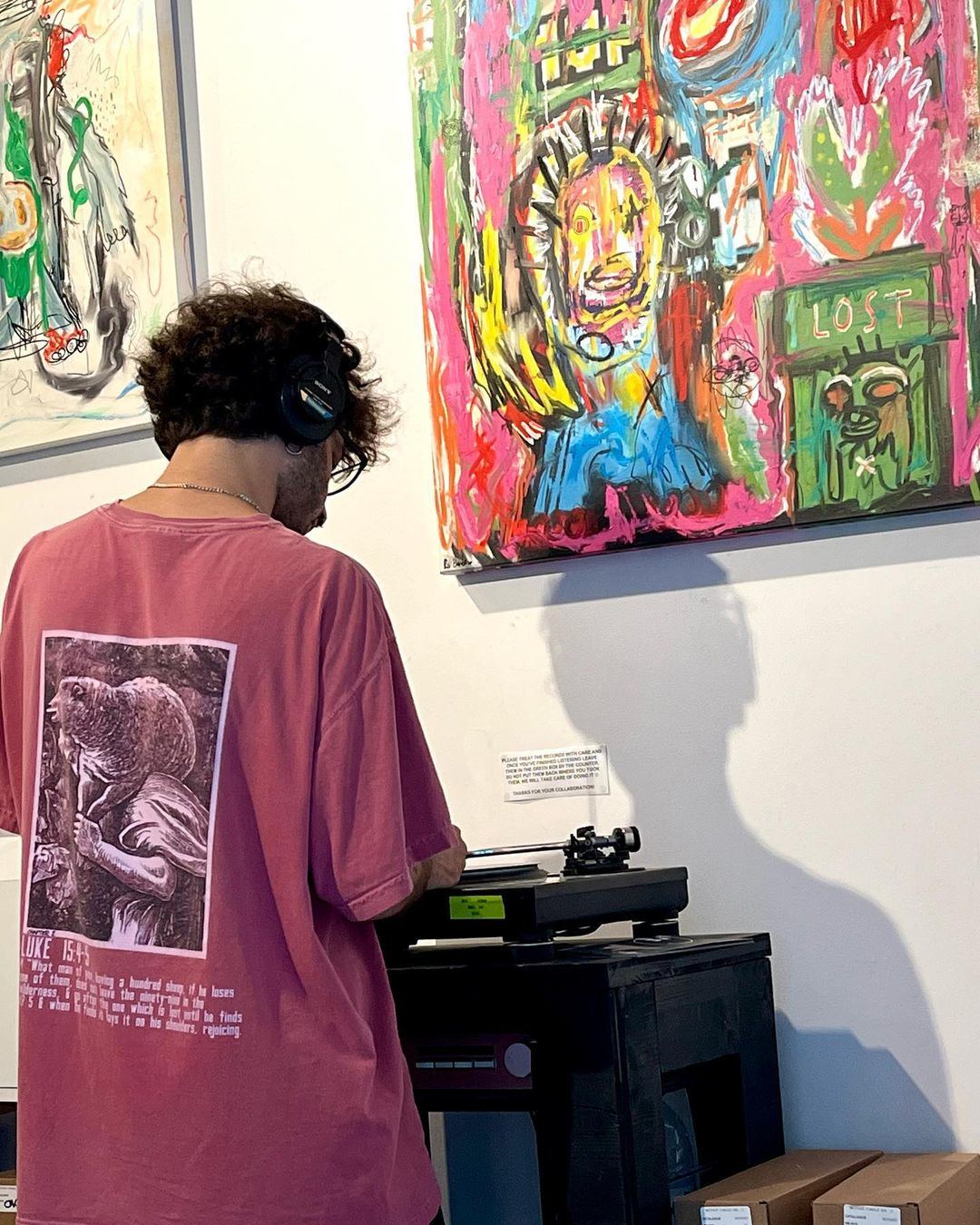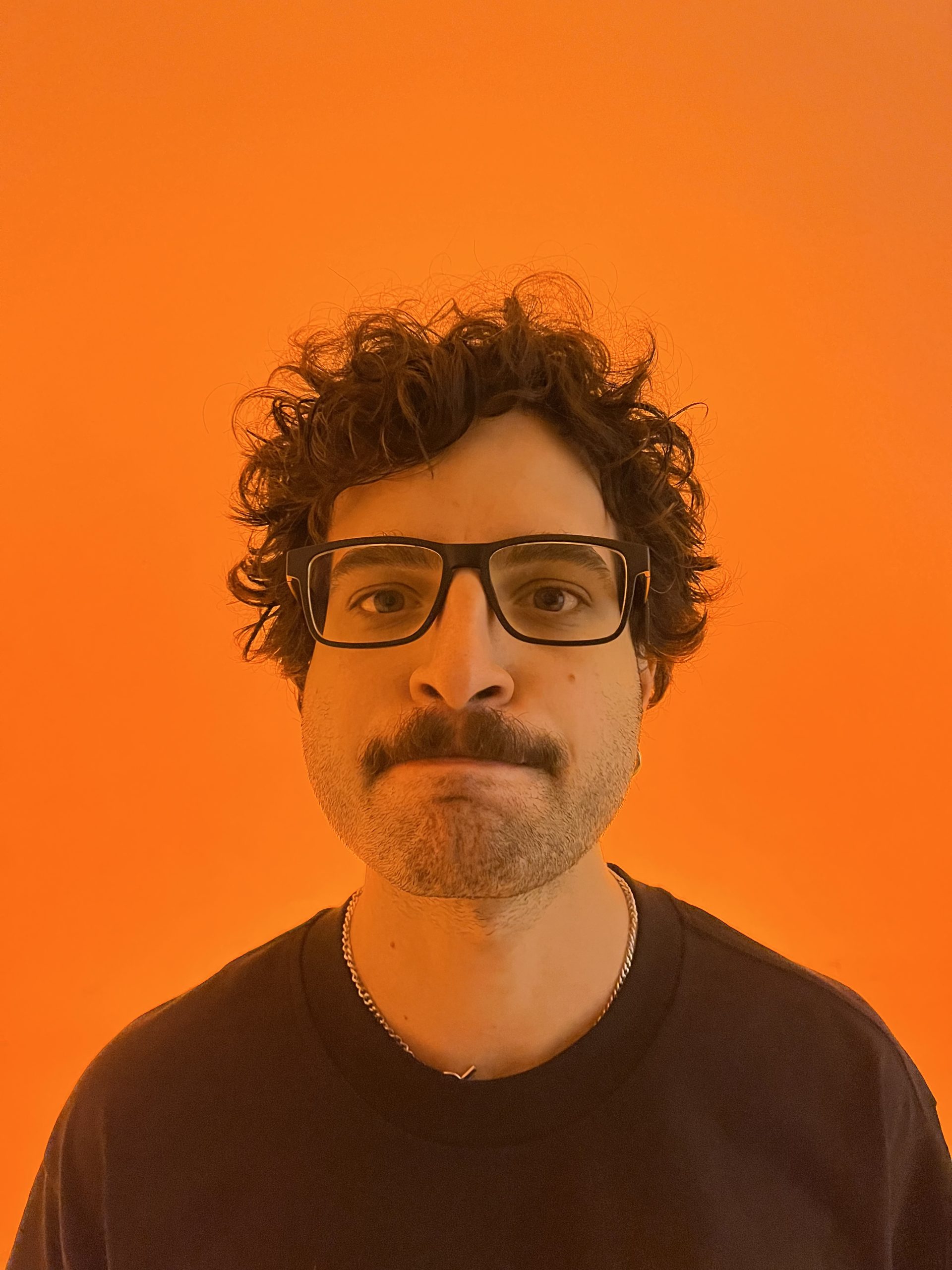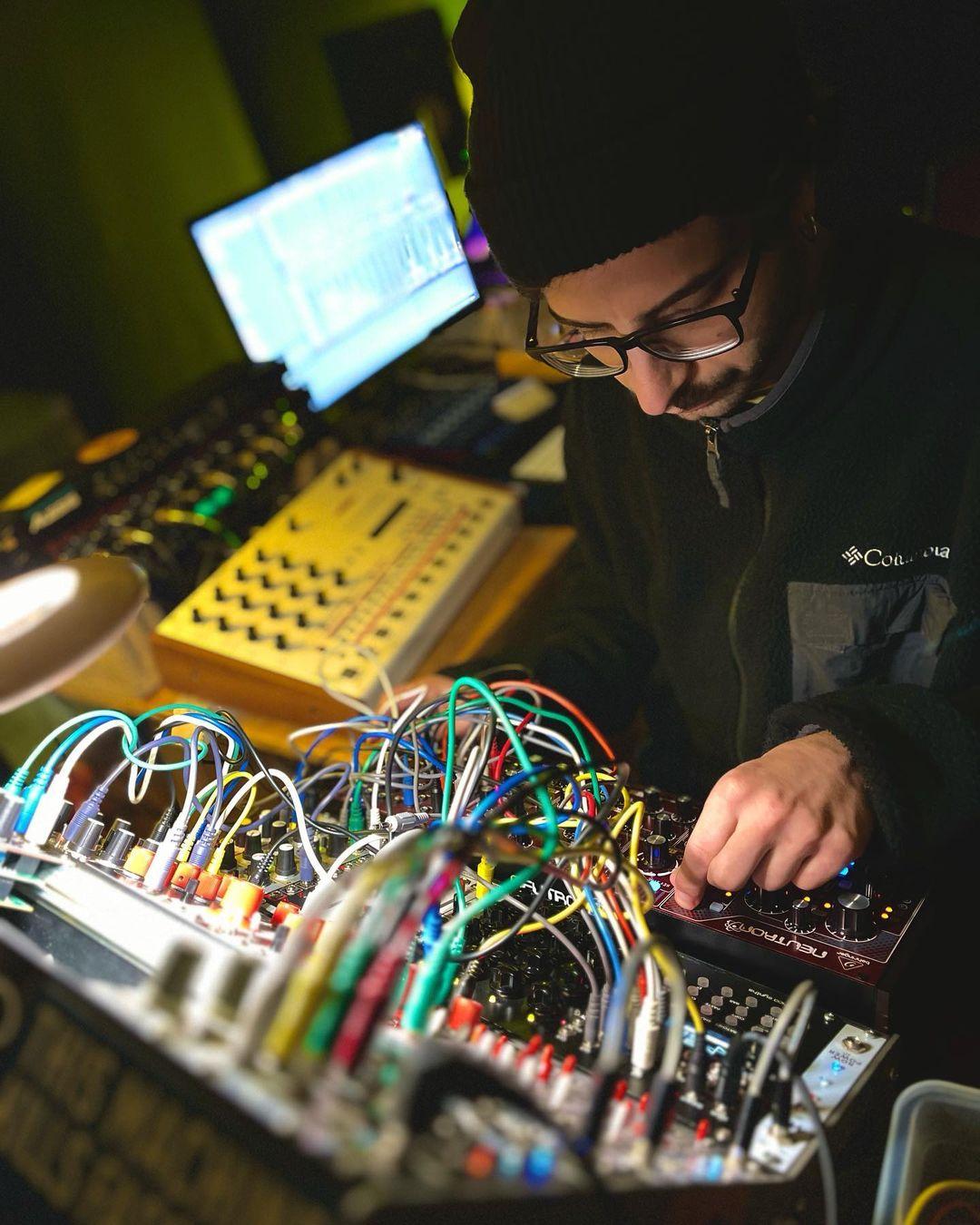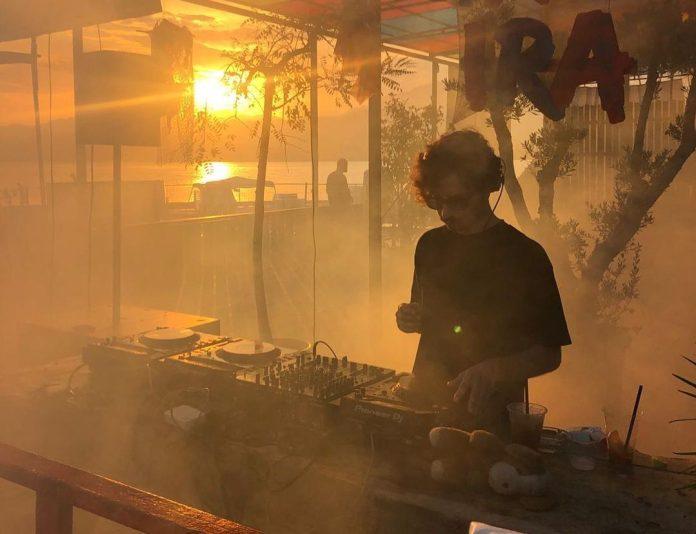Nestled right across the Black Sea from Romania you will find Georgia, and like its neighbours in far reaches of Eastern Europe and Western Asia they have a serious affinity for electronic music and the culture that is ingrained within it. Having a rich history in house and techno and everything in between, their lineage goes back to the 80’s but in recent years they have emerged as a top destination to enrich your soul. As well as the natural beauty that is around every corner there is also a massively informed and diverse electronic music scene that extends from the capital Tbilisi and radiates outwards across the country.
One artist that is at the epicenter of this thriving scene is Audio Space. A resident DJ for Ezo Festival and an in demand artist that has been at the forefront of the Georgian scene since his first steps. We sat down with Nika Shengelia where he explains his very beginnings, “It was around 2006-2007 when I first discovered bits and pieces of the local electronic music scene. It was barely a scene back then, very underground. I was lucky to be living in a neighborhood with a community that was pioneering the culture of Georgian electronic music. There were maybe one or two official clubs offering dance music and parties, but smaller, more underground events were happening too, with very tight-knit communities.”

With more than a passing resemblance to the longer established European music cities, Nika explains the grassroots scene that produced his first event, “The very first party I attended was one I organized with my mates. It was in a garage beneath a residential building, 25 meters underground. That space became our gathering spot, where we exchanged music and hung out. It was like a communal studio. We mostly listened to hip hop back then, but eventually, we got introduced to electronic music and decided to throw our first party. We borrowed a sound system from the neighborhood and played our first electronic tracks. We threw a few more of those parties until the police raided us and shut it down.”
With these first formative events under his belt, it wasn’t long before Nika graduated to providing a more free way of enjoying music, “Meanwhile, the clubbing culture in Tbilisi was growing stronger. The legendary Café Gallery had just opened, the first place where people could party openly and freely. It was one of the first queer-friendly spots in Tbilisi, with parties going on for 24 hours. I spent a lot of time there. The music was a mix of genres, as Tbilisi was still in the early stages of discovering its own musical identity, but minimal was probably the most popular.”
From those early moments in the creation of the Georgian scene much ground has been covered and continues to be covered. From political unrest, to its current state, the promoters, creatives, and dancers have been through a lot to ensure there is a safe space to express themselves. This is a sentiment shared by Nika, “The Georgian scene has evolved so much. Today, it feels like the culture is almost ingrained in the DNA of Georgians. The local scene is one of the most authentic and intelligent I’ve ever seen. Artists and crowds have grown together, influencing each other along the way. From its early stages, this culture has always been pretty political and rebellious in many senses. Nowadays, it’s becoming a bit less underground and more diversely popular, which is a positive development in some ways, though of course, sometimes we’ll miss those “good old days” when things were even more raw. Today, we have very high-quality clubs and festivals, along with top-notch sound systems.”

With hip-hop being the foundation for Nika’s love of music it wasn’t long before electronic music opened up the ears of this young to-be artist. Like most people, it was the help of a close friend that helped show Nika the way, “The community I was part of naturally helped me get started in the electronic music scene. We were all so involved in building it from the ground up. I knew from a young age that I was passionate about music, but back then, it was tough to get records or discover new music. The internet was barely a thing. One of my first big influences was when a friend brought me an Electro House CD, introducing me to artists like Tiga and M.A.N.D.Y. I was hooked immediately. My friend Sumo (now a resident DJ at Mzesumzira) then introduced me to deep dubstep and hyperdub, with artists like DMZ. Later, I discovered the French label Ed Banger Records, which had a huge influence on my early taste in techno, with artists like Justice, Mr. Oizo, and Sebastian.”
By this point, Nika clearly had already developed a wide and varied music taste and that would soon lead to him being inducted into the scene that he had held in such high regard. After graduating from throwing his own low key events, it was time for Nika to take his first steps in the world of clubs, “My very first gig was in 2012 or 2013 at a private party at Café Gallery. I had spent so much time there before, dreaming of playing in that DJ booth, so it was a dream come true when it finally happened.” With his name slowly becoming known in the right circles, it was time for Nika to think bigger and that meant entrenching himself in one of the world’s finest clubbing cities in the world, “Soon after, I decided to go to Berlin to dive deeper into techno and house music. Back then, Georgians still needed visas to visit EU countries, and I was just 18, barely old enough to get into clubs. I was super lucky to experience Berlin Atonal, which had a huge impact on my taste and vision for electronic music. After that, I knew what I wanted to create in my work. When I returned to Tbilisi a few months later, I slowly started getting more regular gigs in the local clubs.”
It wasn’t long before Nika returned to Georgia and he began to rise through the ranks and this soon transferred into regular bookings, “I think it was when I had a few really memorable gigs in a row and started getting multiple offers to become a resident DJ at clubs and festivals. That gave me the confidence that I was headed in the right direction. But even now, I feel like there’s still so much ahead of me to learn and achieve in my career.” Now that Nika’s DJing career was off to a great start it was time to begin producing his own tracks. With production being put on the back burner some time ago this would soon all change, “I started out producing hip hop beats for my friends in our garage studio, but it never got serious. I wasn’t comfortable with DAW at the time, so I took a break from producing for a few years. Then, when I was in Berlin, I discovered SchneidersLaden, a shop that introduced me to the world of modular synthesizers.”

Nika continues his story on how he then began to further his understanding of sound and his skills in the studio, “After that, my goal was to build a studio where I could start producing electronic music. That’s why I got my first serious day job—to save up money to buy hardware. My first synth was a Korg MS-20 semi-modular, along with a Roland TR-8. Slowly, I started learning more about synthesis and sound design on my own. I attended a few workshops in Berlin, which helped me pick up some useful tools. And I have taken an audio engineering course. I’m the kind of person who reads manuals and watches tons of videos on production techniques and workflow.” Further explaining his use of hardware, Nika has taken the next steps in his education, “Eventually, I started building my own modular synthesizer, which took my production skills to the next level and deepened my understanding of synthesis. During the COVID pandemic, I had to sell my entire studio, but recently I’ve been able to rebuild it, and now I finally have a setup where I feel comfortable producing again. In the beginning, my sound was a bit all over the place, more focused on sound design, but I was leaning towards techno.”
In recent years Nika has become an integral part of the setup at Ezo Festival and in turn this gathering has become an even bigger part of the musical identity of Georgia, “I became a resident DJ at EZO Festival/Mzesumzira in 2017. EZO was a bit of a disruptor in the Tbilisi electronic music scene. It offered a different style and vibe from the underground clubs that were gaining popularity back then. Since 2015, EZO has been offering the first big outdoor, daytime-focused parties that quickly became crowd favorites. Over time, it has evolved into a high-quality summertime festival, with a series of parties throughout the season. Besides being a resident DJ, I don’t have an official role at EZO, but sometimes I get involved in creating festival lineups, booking artists, and inviting guests. As I see it, EZO is growing each year and carving out its unique place and identity in the Georgian scene. If the country’s political and economic situation doesn’t get in the way, I think EZO could become one of the most special places in the world to party.”
As well as Nika’s bookings continuing to flourish thanks to his productions and of course his well received performances, he now has his sights set to the future. This will take the shape of his own record label and we are certain that this will provide an even deeper insight into the sound of Georgia. With his own productions being a mainstay in his arsenal he lets us in on the gear that has utilised on his track for our Free Download series, “For Alercy”, I wanted to create something for the dance floor, something that DJs could play with. I used classic machines like the 808, 909, and 303, along with a bit of my modular setup and a few synthesizers like the Novation Peak.”
You can download Audio Space’s “Alercy” for free from our Soundcloud page now.
More info on Audio Space
Instagram | RA | Soundcloud




![Free Download: Audio Space – Alercy [TFD090 & AT006] (powered by AlphaTheta)](https://trommelmusic.com/wp-content/uploads/2024/08/IMG_2756-scaled-e1723672739177-218x150.jpg)
![Premiere: A1 – Alexander Skancke – Saga Of Subvision [QRK015]](https://trommelmusic.com/wp-content/uploads/2026/02/photo_2026-02-03_17-31-24-324x235.jpg)

![Premiere: A1 – Light Blue File – JUNIOR [RCR002]](https://trommelmusic.com/wp-content/uploads/2026/02/RCR.002.FRONT_.LABEL-Will-Gilliland-100x70.png)
![Premiere: A2 – Lisovskyi – Just One Good Whiff [FIB004]](https://trommelmusic.com/wp-content/uploads/2026/02/B-100x70.png)
![Premiere: A1 – Luke Seager – Touch My Body [ITGR018]](https://trommelmusic.com/wp-content/uploads/2026/01/COVER--100x70.jpg)
![Premiere: B1 – Emi Ömar – Zenro [VS007]](https://trommelmusic.com/wp-content/uploads/2026/02/EP6V_macaron-100x70.png)
![Premiere: 1 – Astro Dime – Together [DTN006]](https://trommelmusic.com/wp-content/uploads/2026/02/Premiere-1-Astro-Dime-Together-DTN006-100x70.jpg)
![Premiere: A2 – Droxal – Christal Echoes [MELCURE014]](https://trommelmusic.com/wp-content/uploads/2026/02/MELCURE_014_FINAL-Jose-Ignacio-Abascal-Souto-100x70.png)

![Free Download: Ricardo Baez – Thank You (The Closing Track) [TFD127]](https://trommelmusic.com/wp-content/uploads/2026/01/photo_2025-08-25-22.21.11-e1769601606646-100x70.jpeg)